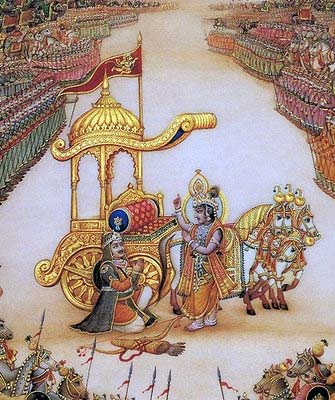Gita Jayanti: Continuing the Eternal Conversation
By Ekendra Dasa | Dec 18, 2007

This Thursday is Gita Jayanti when Vaisnavas around the world celebrate the dialogue between Lord Krishna and Arjuna found in the classic Vedic text Bhagavad-gita. In ISKCON centers, Hindu temples, villages and homes devotees commemorate Gita Jayanti as the day when the Bhagavad-gita was spoken amidst the opposing armies on the battlefield of Kurukshetra.
Bhagavad-gita’s message transcends its immediate historical context and reveals timeless truths. The question and answer format elucidates metaphysical subjects such as action and reaction (karma), as well as the distinction between matter (prakriti) and the living entity (jiva). Krishna and Arjuna discuss the qualities of the Supreme Universal Controller (isvara), as well as the concept of time (kala).
In the beginning of chapter four, the Bhagavad-gita gives an account of its own history that may challenge our existential mindset. Srila Prabhupada writes in his commentary, “A rough estimate is that the Gita was spoken at least 120,400,000 years ago; and in human society it has been extant for two million years. It was respoken by the Lord again to Arjuna about five thousand years ago. That is the rough estimate of the history of the Gita, according to the Gita itself and according to the version of the speaker, Lord Sri Krishna.”
If it’s difficult to accept the Gita’s professed scope of timelessness, you may find it easier to appreciate that it has been part of humanity’s literary culture for millennia. The Bhagavad-gita is said to be the most commented upon book in the religious history of humanity. In India, nearly every major teacher since antiquity has contributed a commentary on the treatise.
The late religious historian R. C. Zaehner formerly of Oxford University claimed, “Of the sacred books of the Hindus, the Bhagavad-gita is the most widely read and probably the most important text for understanding eastern mysticism.”
Devotees who regularly bathe their intellect in the Gita’s wisdom, recognize its application to life in the twenty-first century. Thus for many, this Thursday’s events are not only a way of honoring the past, but a way of expressing gratitude for the Gita’s relevance to the present.















